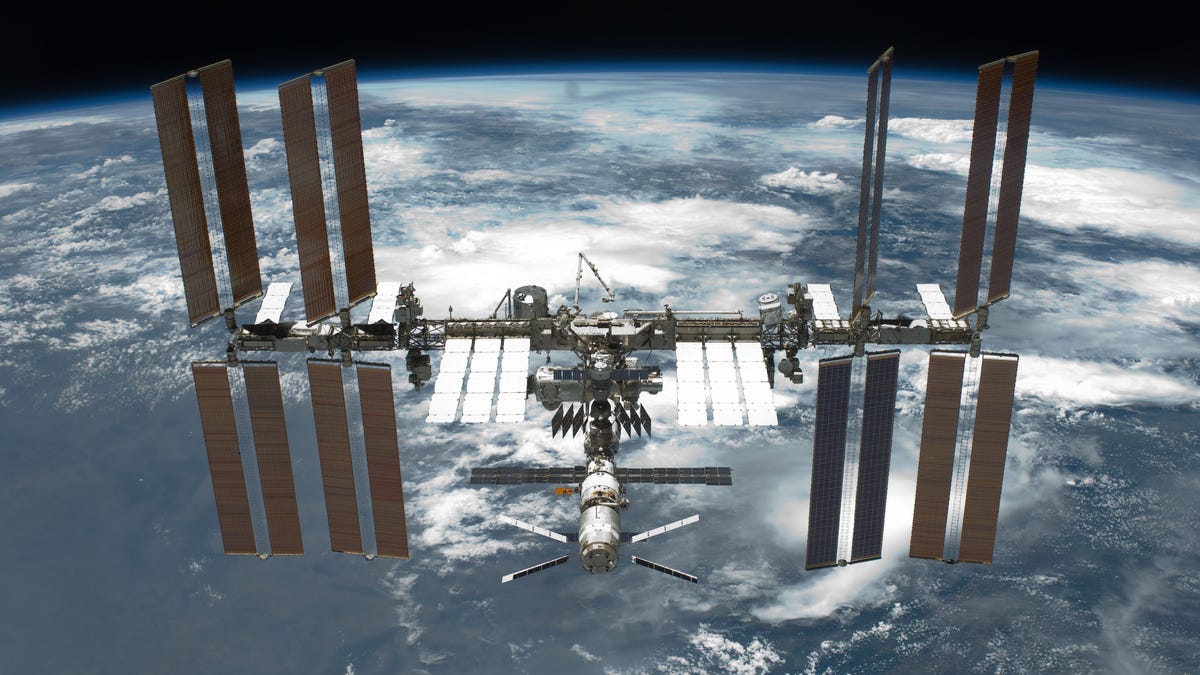FCC wants to try to clean up space
The FCC is reviewing rules to help deal with the 500,000 pieces of zombie satellites and other space debris orbiting the Earth.

In a twist worthy of a Hollywood plot line, the ISS crew was forced to take shelter in the station's Soyuz "lifeboats" shortly after the station was completed. A piece of space junk passed near the ISS but caused no damage.
Who's in charge of cleaning up all the space junk orbiting Earth? That's the question the Federal Communications Commission is officially asking as it takes comment on a proposal to review its orbital debris rules.
The FCC voted unanimously on Thursday to revamp its 2004 rules. Since the rules took effect more than a decade ago, there have been loads of new technologies developed and many more satellites launched into space. But when old satellites no longer function and turn into zombies, they contribute debris to an orbiting trash heap in space. NASA estimates more than 500,000 pieces of debris, or "space junk," are traveling around the Earth.
It's a real problem. As the volume of space debris increases, so does the potential for danger to unmanned and manned space vehicles, like the International Space station. There's also a risk of debris falling to Earth and injuring people.
"It's been over a decade since we last reviewed our orbital debris rules, and in that time, the number of satellites in use has increased dramatically," FCC Chairman Ajit Pai said in a statement. "So it's high time for the commission to take up this important topic once again."
The problem is only getting worse, as space gets more crowded, Pai and his colleagues said. In a separate vote Thursday, the FCC gave Elon Musk's SpaceX the green light to launch more than 7,000 satellites that can be used to deliver broadband in hard-to-reach areas.
The FCC, which is the primary regulator of the communications industry, recognizes the significant risk posed by all this debris, and is seeking public comment on a proposal that the agency hopes will help set rules to "mitigate the threat posed by orbital debris," Pai said. The agency is exploring six ways to address the problem, including changes in satellite design, better disposal procedures and active collision avoidance.
While the FCC can set new rules for which spectrum bands are used and what technologies can use the airwaves from space, it's not the only agency working to solve this problem. NASA, the Department of Defense, the Federal Aviation Administration and the new Office of Space Commerce, also have expertise and jurisdiction over the launch and tracking of satellites.
Pai's two Republican colleagues, Michael O'Rielly and Brendan Carr, have questioned what role the FCC should play in making these rules. In his remarks at the meeting, Carr thanked his colleagues for including questions in the proposal to determine if the FCC is the right agency to develop these rules, when so much expertise exists in other government agencies.
"Are we the expert agency to make these assessments?" Carr said in a statement. "We can respond by saying, hey, we've got a lot of smart people at this agency, and this isn't rocket science -- except it is. It is literally rocket science we are engaging in."
But Democrat Commissioner Jessica Rosenworcel said she doesn't think the proposal goes far enough.
"It asks loads of technical questions about what sorts of information about orbital debris we should expect from satellite operators, but it fails to set forth a vision for the coming commercial space age," she said. "Likewise, it proposes no principles or measurable goals for space safety."
The vote on the proposal at the November meeting was part of the agency's "space month." In addition to dealing with space junk and the approval of SpaceX's satellites, the FCC considered three other satellite items.
It voted to simplify its licensing process and encourage the launch of new satellite systems. The proposal eliminates redundancies in licensing processes to allow for faster satellite deployment and reduces paperwork burdens on satellite operators.
"These changes are intended to ensure that the United States remains the most desirable country in the world for licensing and operating satellites," Pai said.
In another item considered Thursday, the FCC granted the European Union's version of GPS, called Galileo, access to the US market. The agency also cleared the way for Earth stations in motion, or ESIMs, which provide high-speed broadband on aircraft, ships and trains. The FCC action will allow ESIMs to communicate with non-geosynchronous orbit satellites, known as NGSOs, in an effort to to make it easier for consumers on the go to get access to satellite delivered broadband services.
CNET's Holiday Gift Guide: The place to find the best tech gifts for 2018.
Best Black Friday 2018 deals: The best discounts we've found so far.

